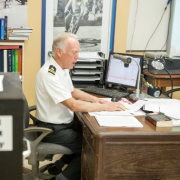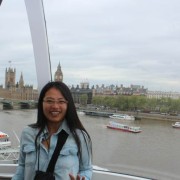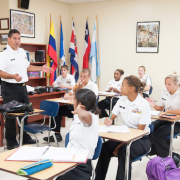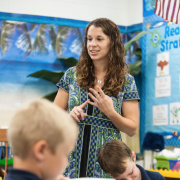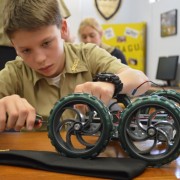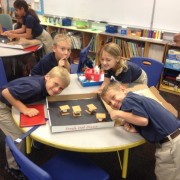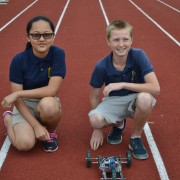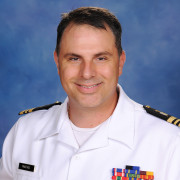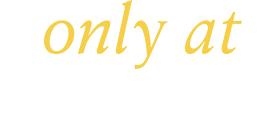Mrs. Deitche awarded FAWQC E2 grant to perform student-wide mangrove experiment
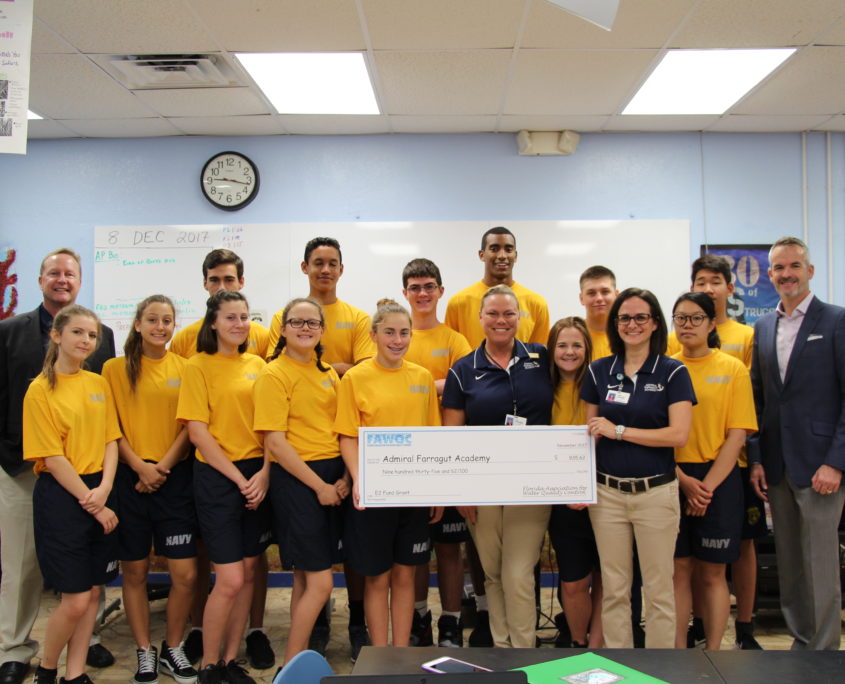
On Friday, December 8th, 2017, Science Department Head and Biology and Marine Science teacher Sari Deitche was awarded the Florida Association for Water Quality Control (FAWQC)’s Environmental Education (E2) Fund grant.
The award was presented to Mrs. Deitche by Florida Association for Water Quality Control Vice President Scott Deitche and Treasurer Jon Hull. This $935.62 grant will be the ninth FAWQC grant and the 17th grant in general that Mrs. Deitche has been awarded. In all, she has earned $48,245.42 for her classes since she started at Farragut in 2002.
FAWQC is an association of professionals dedicated to managing, improving, and protecting the quality of Florida’s waters. The FAWQC E2 Fund was established to promote environmental education and awards grants for environmental projects at Florida schools, civic or community organizations, and awards prizes at Florida science fairs. E2 Grants are awarded based on the proposed project’s overall environmental value as to:
- Fostering awareness and understanding of a water related issue;
- Being cost effective;
- Basing the project on sound science principles;
- Promoting involvement of students or citizens; and,
- Promoting enhancement of a water resource or associated habitat.
“Out of the 26 schools that applied and the 13 schools that earned awards, AFA was ranked number one,” said Mr. Deitche.
“We score based on guidelines, such as science principles, budget, and how many kids will be affected,” Mr. Deitche continued, “and then those scores are weighted and automatically sorted in an excel spreadsheet.”
“We’re looking for measurable results and conclusions,” Mr. Hull added.
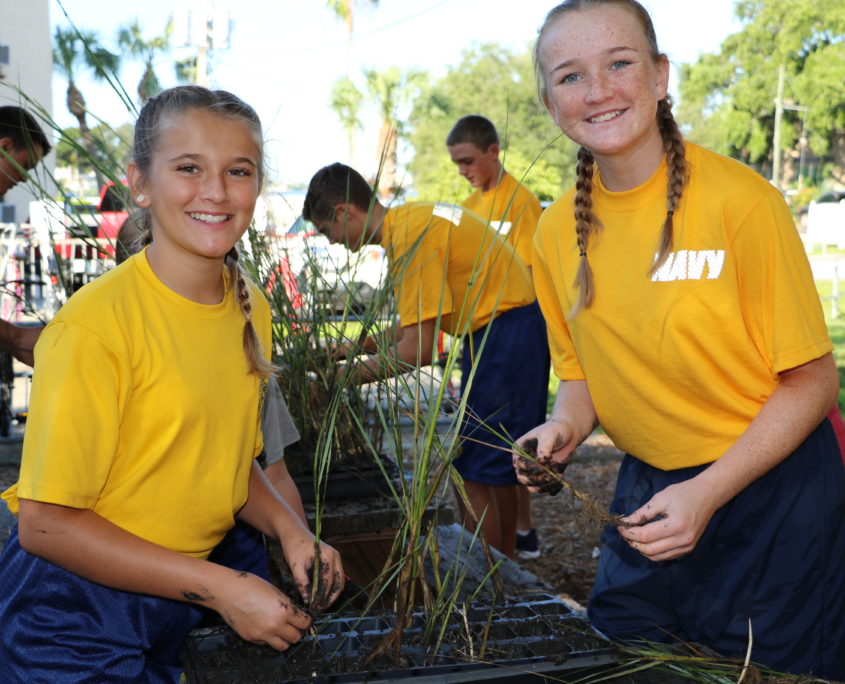
The grant will be used for an experiment, including all science classes in Lower to Upper school, to help them study and learn about the importance of mangrove habitats. “Applying the scientific method, students will perform an experiment to predict and evaluate how different conditions affect mangrove health,” explained Mrs. Deitche. “Discussions about climate change, water quality, pollutants, and human impacts, will illustrate real-world examples of shoreline erosion and mangrove degradation.”
For the project, students will grow red mangrove seedlings in tubs that are kept within a 16’ x 16’ school salt marsh nursery. Students will also design experiments to grow the mangroves in different water and/or substrate conditions, such as sand only and mud only.
First, Project Lead The Way (PLTW) and Engineering teacher, Gary Frost, and his STEM class will design a pump using CAD. Second, Science and Robotics teacher, Grady Heiss, and his Robotics class will build the pump and install it into the nursery.
“Then the pump will circulate the water to help simulate the natural tidal environment where mangroves grow,” said Mrs. Deitche in excitement. “My science students will be in charge of monitoring the water levels, salinity, DO, nitrate/nitrite, pH, and other parameters. They will also take and log all measurements of root length, root size (width), root weight, and stem growth (at top of propagule). The AP Bio students will then design data charts and help calculate necessary measurements. The older high school students will interpret the data and teach the younger students the importance of the data and what is being discovered through the data and calculations.”
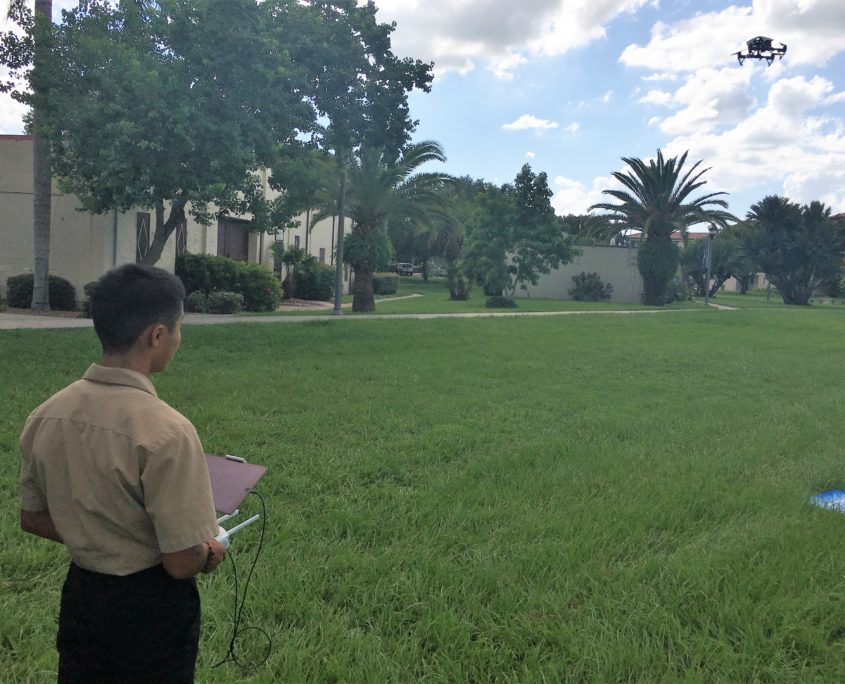
The STEM Program students will fly drones over the waterfront and take footage of the mangroves growing naturally at the school’s waterfront. “We plan to timelapse the footage so students can see how the shoreline changes,” explained Mrs. Deitche. “This project relates to the importance of mangrove shorelines from the habitat they provide to their role as shoreline stabilizers. Issues that may affect mangrove health, especially in Florida, include climate change, erosion, water quality and pollution issues. Students will do field research at the school waterfront, discovering many of the different marine species living in and among the mangrove habitats (e.g. mangrove crabs, oysters, juvenile fish, such as snook, mullet, sea robins, horseshoe crabs, etc.) There are also herons and pelicans that visit the mangroves frequently, building nests for their young.”
One other issue that affects mangroves and is apparent on AFA’s campus are invasive species. “On our own school-front property, we have issues with invasive species encroachment from Brazilian pepper trees,” added Mrs. Deitche. “Discussions can be added to the indoor and outdoor classrooms about how invasives can inhibit natural mangrove development, thus weakening shoreline stabilization.”
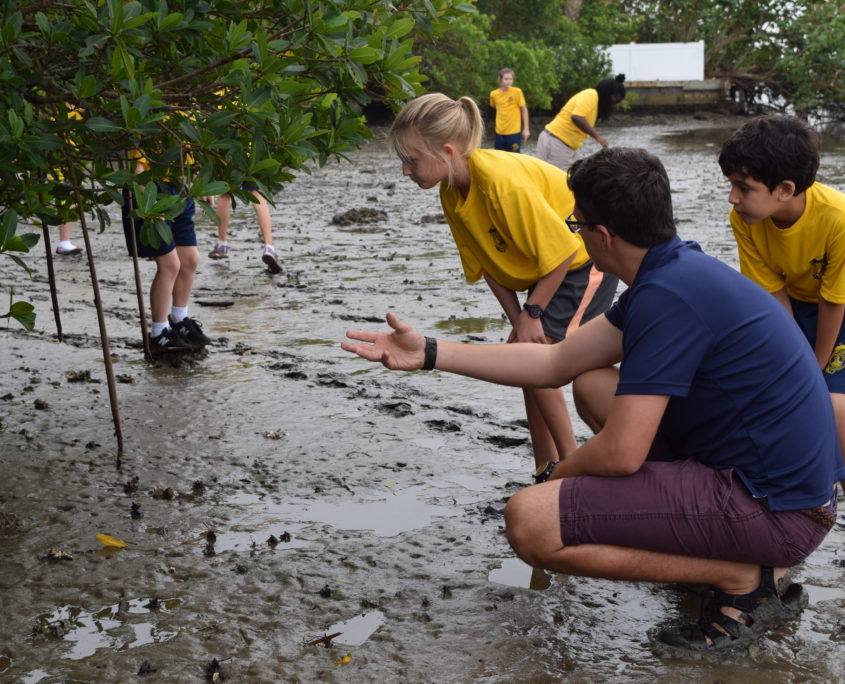
“The kids have been asking a lot of questions in class about these things,” Mrs. Deitche said. “Something that our school and all schools are struggling with is writing hypotheses. AP Bio in particular was scoring low on writing hypotheses. A new requirement this year in the AP curriculum is writing a null hypothesis ((in a statistical test) the hypothesis that there is no significant difference between specified populations, any observed difference being due to sampling or experimental error.) If the students are struggling with hypotheses then how can they write a null hypothesis? Something I worked on last year was how can we get stronger in writing hypotheses, and I’m hoping to work that into this experiment.”
“There’s a lot of different facets to this grant, and I think each class is going to run with this in different ways.”
“Unfortunately the grant is only running for a semester,” Mrs. Deitche continued. “We would have liked to have run the experiment for multiple seasons and see how it fluctuates.”
The effects of the experiment on the learning of the students will be long-lasting, not just in their findings but in the equipment Mrs. Deitche will be able to supply with the money.
“Another criteria is if you want to purchase equipment that is reusable versus just consumables,” Mr. Deitche said. “We like when there’s equipment that can be used for years.”
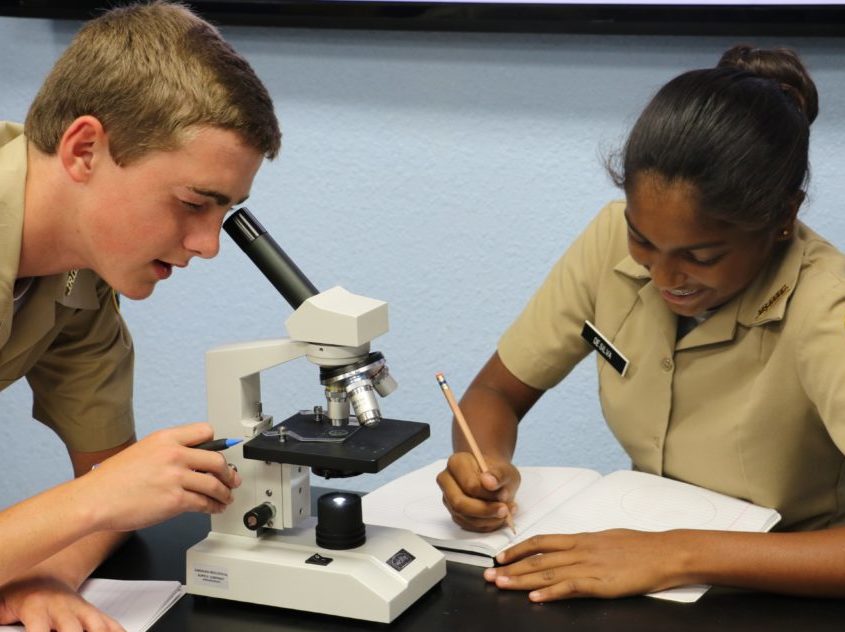
“We purchased a digital thermometer gun that we can point at the plants and get the temperature reading without disturbing the plant,” Mrs. Deitche said. “We’re getting a microscope out of it, as well as tubs and lamont test kits. Real laboratory grade equipment. The kids love it because they feel like they’re scientists.”
“We hope some of them do become scientists,” Mr. Hull said. “I was collecting samples yesterday, logging them this morning, and I’m going to drop them at the lab later. That’s the kind of thing we want the students to learn here so it’s not unfamiliar when they go to college and into a career.”
“We’ve had quite a few who have changed their minds when they come through our program and gone on into some sort of science-related field,” Mrs. Deitche said.
Mr. Hull believes he knows the reason why.
“I’ve sat in Mrs. Deitche’s classes before,” said Mr. Hull. “She’s a wonderful and engaging teacher.”

